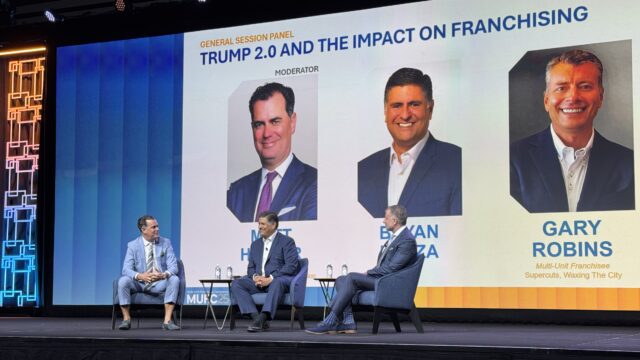Franchising in the Trump 2.0 Era: Key Takeaways from the Multi-Unit Franchising Conference Panel

With President Trump’s second term underway and the GOP now controlling both chambers of Congress, the 2025 Multi-Unit Franchising Conference tackled one of the most pressing questions on franchise leaders’ minds: What does this mean for franchising?
In a packed general session titled Trump 2.0 and the Impact on Franchising, panelists Matt Haller (President & CEO, International Franchise Association), Bryan Lanza (Trump insider and principal at Mercury), and Gary Robins (multi-unit, multi-brand franchisee) delivered a candid conversation and insider’s perspective on the new political landscape and what it means for franchise businesses.
Franchising as Part of the Trump Agenda
Lanza opened with a sharp insight into Trump’s successful campaign strategy, highlighting how it resonated with working Americans concerned about inflation and the economy. One turning point? “Trump at McDonald’s,” Haller noted. It wasn’t just a photo-op—it was a cultural signal. “McDonald’s is part of everyday life. That moment symbolized his connection to the average American,” Haller said.
This cultural connection is critical, especially in a franchise economy that thrives on local relationships and main street presence.
What the First 100 Days Tell Us
While Trump’s leadership style has been disruptive, the panel emphasized that disruption can deliver better outcomes over time—especially for franchising.
“He’s not always top-tier on process and sometimes that results in a lot of noise, but he’s focused on delivering what he promised,” said Lanza. That includes tax policy, deregulation, and a strong push for pro-business initiatives.
Robins put it simply: “Trump 2.0 is an opportunity. This is our moment to advance franchising advocacy.”
One critical area of focus? Government efficiency. “Franchisees need to be efficient to grow. It makes sense to push for a government that operates the same way,” Robins added.
Joint Employer and Advocacy Priorities
One of the panel’s most urgent policy discussions centered on the joint employer standard —a legal definition that has changed four times in the past 10 years, defining how franchisors and franchisees share responsibility over employment practices.
“Joint employer isn’t a partisan issue—it’s a business issue,” said Haller. “When it fluctuates every few years, it creates instability. We need bipartisan support to fix it permanently.”
IFA is pushing to end this back-and-forth, armed with data: an Oxford Economics study found that franchising provides higher employee wages than non-franchised businesses. But the policy uncertainty undermines that advantage – with employees, business owners, and consumers paying the price.
Educating Washington: The Franchise Story
All three panelists emphasized that advocacy starts with education.
Robins recounted his early experiences with advocacy: “Most lawmakers don’t understand franchising. They think it’s just big corporations. They don’t see the small business owners behind the brand names. We have an imperative to help them understand that franchising is Main Street, not Wall Street.”
Lanza drove the point home: “In D.C., there’s inertia. If you want change, then you have to act. You have to educate. At the end of the day, it’s about numbers—how many franchisees are telling their story.”
The opportunity, they said, lies in personalizing the message: “You’re the neighbor, the coach, the community employer,” Lanza added. “That’s how franchising wins hearts and minds.”
Taxes, Tips, and the Stakes Ahead
With Trump pledging no taxes on tips, the panelists called this a major potential win for both workers and operators. “It’s a pay raise for front-line team members that doesn’t cost small business owners anything,” said Robins.
But looming tax battles could threaten gains. Lanza warned that failure to extend the 2017 tax cuts—particularly for pass-through entities like the majority of franchise businesses—would be “a huge tax increase and a massive loss of parity with [major corporations].”
“This is a full court press,” he said. “Failure is not an option.”
Robins added, “Every part of this touches a franchisee’s bottom line and overall valuation. Whether you’re planning a succession approach or an exit strategy, the decisions and progress we make today matters in the long-term.”
The Power of Franchisee Voices
The panel closed with a call to action. “We’re in a unique window of opportunity,” Haller said. “IFA’s mission is to protect, enhance, and promote franchising—and that only happens when both franchisees and franchisors are both successful.”
Robins acknowledged IFA’s growing focus on franchisee representation: “That balance helps us all succeed.”
Ultimately, the panel left attendees with a challenge: to lean in. To advocate. To educate. And to show policymakers what franchising really looks like—a network of small business owners fueling local economies across the country.
As Lanza concluded: “Trump is a businessman. He knows small business matters. Now is the time to step up and make sure franchising stays at the center of the American growth story.”
What Franchisees Can Do Next
- Engage with IFA Advocacy Efforts: Support bipartisan efforts around Joint Employer and tax policy. Join the Franchise Action Network here – and come to Washington this fall for the IFA Advocacy Summit.
- Tell Your Story: Highlight your community impact, the way you impact your employees’ lives, and help shift public perception. Reach out to IFA to help us tell your story to lawmakers and give them a first-hand look at the contributions you make to those around you.
- Stay Informed: The Trump administration is moving fast—understanding the policies behind the headlines is key to protecting your business.
Franchising has a powerful voice—and under Trump 2.0, it has a powerful opportunity. Let’s use it.